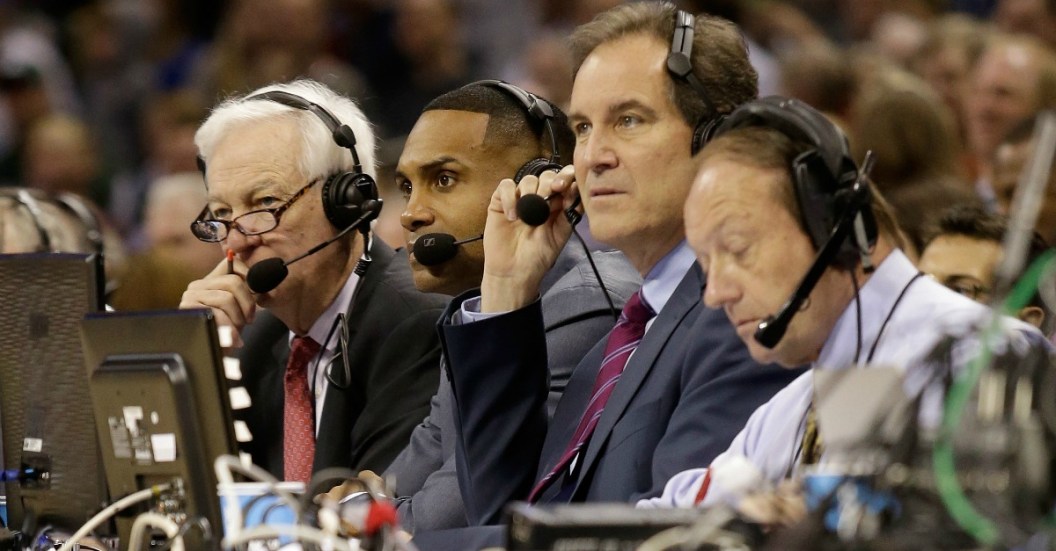One short comment on the air has gotten Jim Nance in hot water.
Videos by FanBuzz
During the Tar Heels thrilling 77-76 win over Oregon, Nance brought up an academic scandal that has been dogging North Carolina. (In short, a report said the scandal involved 3,100 students over 18 years).
Here's what he said:
"They've had to live with all of this, all the swirling innuendo with what went on there with all the academic fraud allegations."
Twitter wasn't kind, noting that the term "swirling innuendo" doesn't go near far enough.
Swirling allegations? https://t.co/pu4QmhCXGo
— Bob Ley (@BobLeyESPN) April 2, 2017
For Jim Nantz, the UNC scandal is "swirling innuendo"....that is one way to put it. I tend to prefer the phrase "systematic academic fraud"
— Matt Jones (@KySportsRadio) April 2, 2017
If academic fraud at North Carolina is "swirling innuendo," Jim Nantz, what was Watergate? "Stubborn scuttlebutt?"
— Tim Sullivan (@TimSullivan714) April 2, 2017
The University of North Carolina released the Wainstein Report that investigates allegations of academic fraud within the African-American Studies department. The study, which you can peruse in its entirety here, offers damning evidence of academic fraud that took place from 1993 to 2001 and involved more than 3,100 students — many of which were student-athletes.
The NCAA was made aware of the report and will work with the school to decide what infractions were made and will further investigate to determine a punishment. The NCAA and UNC released a joint statement via Twitter.
The report opens with it's executive summary that highlights the main findings, chief among them was the "paper classes" that were offered in the AFAM Department.
Between 1993 and 2011, Crowder and Nyang'oro developed and ran a "shadow curriculum" within the AFAM Department that provided students with academically flawed instruction through the offering of "paper classes." These were classes that involved no interaction with a faculty member, required no class attendance or course work other than a single paper, and resulted in consistently high grades that Crowder awarded without reading the papers or otherwise evaluating their true quality.
The report found that student-athletes — the majority of which were football players — made up a large number of the students that participated in these "paper classes"
Crowder felt a strong affinity for student-athletes in particular, and she gave them ready access to these watered-down classes to help them manage their competing athletic and academic time demands...Student-athletes accounted for a disproportionately high percentage of enrollments in the AFAM paper classes. Of the identifiable enrollments in the lecture paper classes, 47.4% were student-athletes, even though student-athletes make up just over 4% of the Chapel Hill undergraduate student body. Of those student-athlete enrollments, 50.9% were football players, 12.2% were men's basketball players, 6.1% were women's basketball players, and 30.6% were Olympic and other sport athletes.
The grades that were given in these paper classes were also highly disproportionate to the average grades made in other AFAM classes.
The average grade issued to all identified students in the paper classes was 3.62, as compared to an average grade of 3.28 for the regular AFAM classes. That difference was even greater for student-athletes. The average grade given to all student-athletes for the paper classes was 3.55, as compared to an average student athlete grade of 2.84 for the regular AFAM classes.
When Crowder retired, the effects on the academic success of the football team was drastic and the football counselors in charge of assisting with their academics warned the team of these changes.
They instructed players to submit their papers before Crowder's departure to receive the benefit of her liberal grading; they warned the football coaches that with Crowder's retirement they no longer had access to classes "that met degree requirements in which [the football players] didn't go to class...didn't take notes [or] have to stay awake...didn't have to meet with professors [and] didn't have to pay attention or necessarily engage with the material;" and they undertook an effort to persuade Nyang'oro to continue the paper classes. They succeeded in getting Nyang'oro to offer a few classes, but not before the football team's GPA fell to its lowest point in ten years.
(h/t Sports Illustrated)

